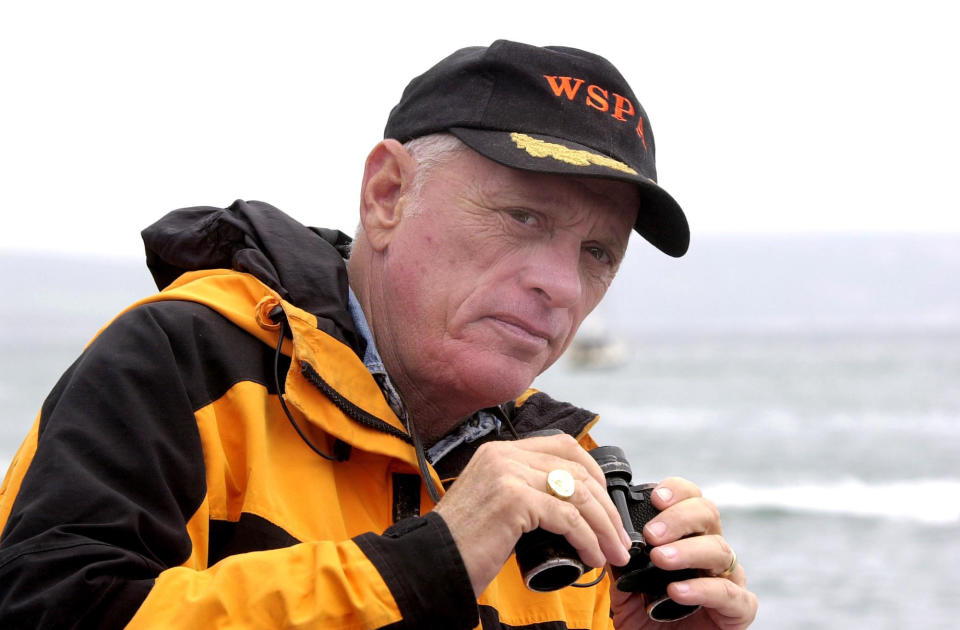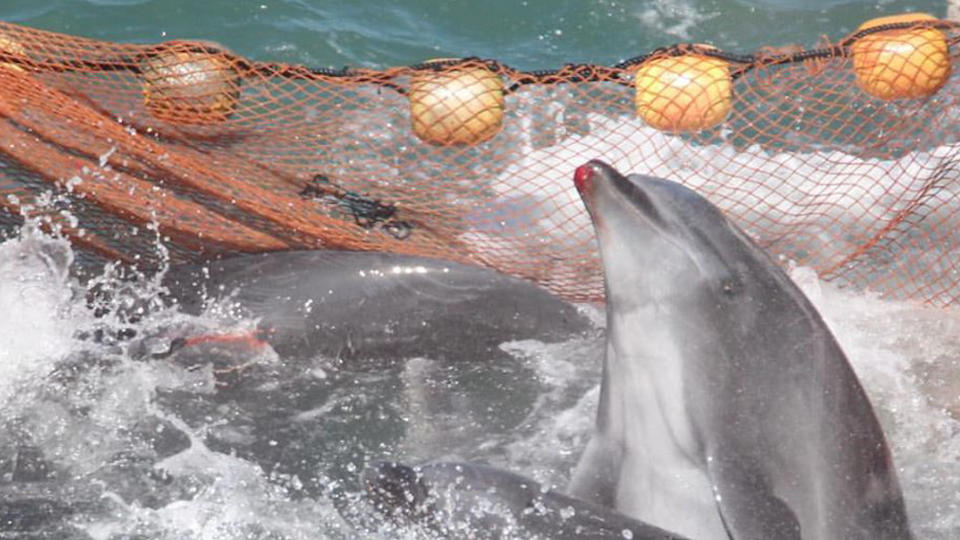'Dirty secrets' of dolphin tourist parks revealed as 'abuse' video emerges
“Disturbing” footage captured in the Middle East has prompted a warning to Australian tourists from one of America’s most famous dolphin trainers.
Veteran animal handler Ric O’Barry, 79, told Yahoo News Australia that video showing a woman laughing and bouncing on top of a beached dolphin was unsurprising.
“The reason I quit is because I got tired of being a professional liar,” he said.
Mr O’Barry learned from his time working at aquariums, and behind the scenes on the 1960s television show Flipper, that cruel treatment of captive dolphins was the industry’s “dirty secret”.

Now he believes mobile phone cameras mean the public is seeing animal abuse that was once hidden.
According to sources, footage of the stunt at Dubai Dolphinarium was initially shared to Instagram account @aurelia_1534, but the post was quickly deleted after an unexpected wave of critical comments from the public.
The video shows a woman in a black wetsuit bouncing on the back of a dolphin as person behind the camera, believed to be a trainer, laughs and says in Russian, “could you at least hold onto his tail... (inaudible)”.

Blunt reaction to dolphin riding stunt
Arizona dolphin activist Crystal Renee, 39, knew the reaction from the general public was important, so she quickly photographed a number of the online comments.
While one person suggested trainers at the facility care for the dolphins, most viewers expressed outrage at what they saw.
“OMG this is disgusting,” wrote one woman.
Another man said, “I cannot believe this trainer thinks this is right or funny”.
Other social media users described the trainer’s behaviour as “horrible” and “shameful”.
Speaking from New Zealand, cetacean biologist Dr Ingrid Visser, 53, told Yahoo News Australia the Dubai video shows “unethical and unprofessional behaviour”.
Dr Visser says the trainer is putting an “undue amount of stress” on the beached dolphin’s spinal column and internal organs.
“There are levels of ‘not okay’ and this is the next level of ‘not okay’,” she said.
“When I look at that video, it sums up just how abused these animals are.
“The claims made by trainers that they really care for the animals is just a thing to hide behind, so they can have their own fun.
“The animals suffer at the expense of that.”
Dark story behind dolphin shows
Dr Visser said dolphins do not choose to do tricks, and only perform these “unnatural behaviours” because they are forced to.
“It’s not fun and games for the dolphin,” she said.
“If it was enriching for the animals you wouldn’t have to give them fish for every single trick.”
Dr Visser has urged the public not to buy tickets to watch dolphin shows, reminding them that the only reason dolphins are in captivity is that people pay to see them perform.
Sources suggest many dolphins performing in fast-growing tourist hubs like Dubai were caught in the wild, shipped to swimming pools, and forced to perform tricks for tourists.
Mr O’Barry once captured wild dolphins in Miami for US dolphinariums, but the “violent” methods they used pale in comparison to modern methods he has witnessed during multiple visits to Japan – a major supplier to the dolphinarium industry.

During multiple trips to the village of Taiji, 240km south of the old capital Kyoto, he has documented fishermen using sound to scare dolphins into a tiny bay.
“They’ll put a long metal pole into the water and using a hammer they bang on that pole which creates an underwater wall of sound,” he said.
“This frightens the dolphins; they’ve never heard this before.”
“And they’re able to herd the dolphins into the ‘killing cove’ this way.”

Dolphins caught and slaughtered in Japan
Once in the cove, Mr O’Barry has watched babies separated from their mothers, as the most “attractive dolphins” are selected for aquariums, where they can reach prices upwards of US $150,000.
Those not selected for aquariums are then slaughtered and sold for their meat.
Mr O’Barry highlighted these practices in the Academy Award winning documentary The Cove, however since its release demand for wild caught dolphins has escalated due to demand from emerging nations.

With Dubai’s economy structured around tourism, Mr O’Barry says there is a push to have more dolphinariums to attract travellers like those seen in Australia and the US.
“It’s a copycat syndrome, they’re all copying SeaWorld in America, and making all the mistakes we made,” Mr O’Barry said.
Distressing photos show whales in 'ridiculously small tank' at aquarium
Man's tragic find after pulling in 'illegal' trap from river
After Flipper died, Mr O’Barry quit his job as a dolphin trainer and now travels the world highlighting the plight of captive dolphins, but he has been unable to protest in Dubai due to fear of arrest.

A report in The Gulf News suggests Dubai Municipality is investigating the trainer’s behaviour in the Instagram video.
The Dubai Dolphinarium did not respond to Yahoo News Australia before deadline.
Do you have a story tip? Email: newsroomau@yahoonews.com.
You can also follow us on Facebook, download the Yahoo News app from iTunes or Google Play and stay up to date with the latest news with Yahoo’s daily newsletter. Sign up here.



